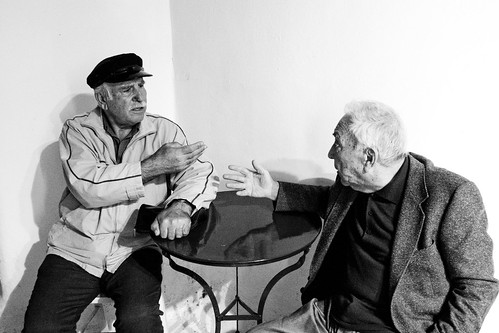
How does Opinion become Knowledge?
How can one person's view become the accepted knowledge of a community or of an organisation?
How can "what I think" become "what we know"?
(photo from Flickr creative commons, by greekadman)
This is a question that has been concerning me for some time, especially as the publishing of opinion has become so much quicker and simpler through readily accessable blogs and wikis. There is now so much opinion to be had - how much of this is actually knowledge?
You could argue that opinion becomes knowledge when it is held collectively. There is something to be said for the concept that knowledge is collective. "We know". Many people believe in the wisdom of crowds, for example, which might suggest that opinion is individual, knowledge is collective. However it is a small step from the wisdom of crowds to the madness of the mob. It wasn't that long ago that "We knew" that banks were safe, and that the sub-prime mortgage market was a sensible bet. Just because an idea is popular, doesn't mean it is right - doesn't make it "knowledge".
You could argue also that opinion becomes knowledge when it is authenticated or validated by a person or group. An opinion can be peer reviewed and can become approved as knowledge. Validation and approval is an important and vital step when dealing with knowledge which has serious implications for safety, for example. The knowledge which entered the Chrysler EBOK (electronic book of knowledge) was proposed by the communities ("tech groups") but then validated by a company expert and scanned by a lawyer before it became accepted, because "wrong knowledge" could cost lives. Any company in heavy industry, or concerned with product safety, will be very keen to validate it's knowledge. Behind this lies the principle of accountability. Someone needs to be accountable for ensuring that knowledge is valid, and if something goes wrong, they take the blame. You can't blame "the crowd".
You could also argue that opinion becomes knowledge when it is tested in practice. This is close to my personal stance. An opinion is like a scientific hypothesis - it is an interesting idea, but not yet knowledge. Once you try it, and it works, it becomes a scientific theory (or in our case, it becomes knowledge).
I think in general we need a mix of these. An opinion becomes knowledge when it is tested in practice, and is validated as having been tested by an authority (or group) speaking on behalf of the community.
So why is this question of validation so important? Partly because of the rise in blogging
Blogging in organisations is still a minority sport. If we follow the 90:9:1 rule that applies to wikis, and apply it to blogs, then out of every 100 people in an organisation, one will actively and routinely blog. 9 might read the blog and comment, and maybe post some small items of their own, while 90 will never contribute. If we take blogs to be knowledge, we are only sampling one or two percent of the organisation, and what we find is mostly opinion, and can be a small minority opinion.
There are exceptions to this - subject matter experts or community leaders in an organisation may publish blogs where they share validated community knowledge, for example. I saw one organisation where the head of data security used a blog to share changes in procedures and new best practices, which really were validated knowledge and which the organisation was expected to follow. Apart from these exceptions, the majority of blogs (including this one) are individual opinion.
Wikis are the same. There needs to be a validation process. There needs to be a stamp of approval. Even wikipedia has a validation process, to overcome the recent spate of knowledge vandalism (such as the false announcement of Senator Kennedy's death). I have seen wikis in organisations descend into arguments of opposing opinions when there is no validation process. Shell, in their voluminous and authoritative Shell Wiki have clear validation rules - anything in the wiki article is validated, anything in the discussion on the wiki article is opinion. I know the original idea was that wikis are "self validating", or validated by "the community", but as discussed above, the community may not be that knowledgeable, and the community cannot be held to account.
There is a saying, that a little knowledge is a dangerous thing. A few unvalidated opinions are even worse. One of the community question and answer forums I work with has an introductory message along the lines of "Answers received from this forum are the opinions of the writers. They should not be taken as authoritative. In case of doubt, check with your technical authority". We need more such warnings, in my opinion, if we are to find our way through the thickets of opinion to find the bedrock of knowledge.




No comments:
Post a Comment